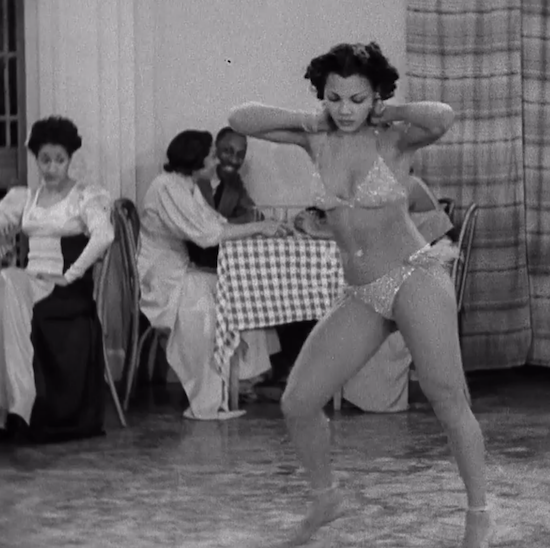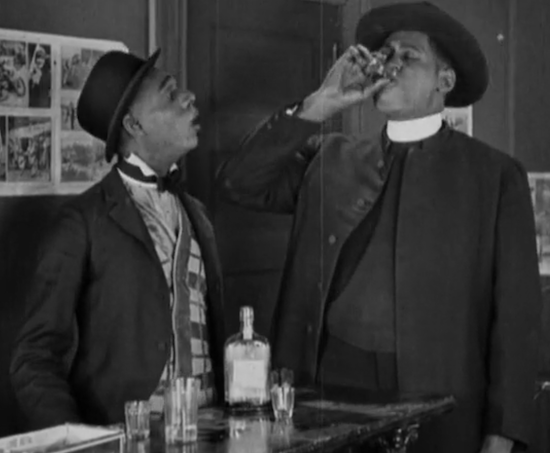“An educated Negro,” smirks a crooked policeman in Oscar Micheaux’s Birthright (1938), “Is a dangerous thing to have around.” Micheaux, the most prolific African American film-maker, was a disruptor of grand scale, the precursor of Spike Lee’s brash activism and Donald Glover’s intelligent satire. His silents and talkies, dating from 1918, are a flicker-book of dangerous images: a head of white cotton plucked by Black hands and swelling like a bloated brain; a virgin’s hymenal blood on a man’s brogues. While other independent makers of ‘race films’ struggled to gain one or two bookings in segregated picture houses, Micheaux released films every year till 1940, sensationally attacking racial hypocrisies. So why are his works rarely critiqued?
Most were lost. But another obstacle is Micheaux’s audacity at being both politically outspoken and a showman. He resists summing up. “One of the greatest tasks of my life,” he said, “has been to teach the coloured man he can be anything.” Believing that Black artists “can be anything”, Micheaux chooses to give his audiences a good time.
Salty plots and street brawls expose the shadow side of Hollywood packages. Micheaux makes musicals, gangster movies, melodramas, African adventures and Westerns, with all-coloured casts. His ‘Lawdy-Lawdy’ stereotypes of poor Blacks may grate. Inter-titles about “nigguhs” may offend. Beginning with the rape scene of Within Our Gates and the abortion reference in The Homesteader (both 1919), Micheaux loves the lurid. Just as Rose, a mouthy servant in Birthright tells its lofty hero, “You ain’t no Black Jesus,” he won’t stomach a pious parable. What to do with Oscar Micheaux?
Micheaux himself wouldn’t have waited for our judgment. Born to a family of slaves in Illinois, handsome, tall and meaty, he swept into meetings in Russian furs and rode a chauffeur-driven car. To secure advance bookings, he hulked his stills to theatres, taking actors with him to act out scenes. When he had the money, he bought out full houses and sauced the night with singers. When he didn’t, he’d film an actress in a borrowed sable in a side room while the owner sat oblivious in his office. On-screen, Micheaux’s America is America on the hustle. Around any street corner, or sofa, some Black hoodlum or white lady might filch your hard-won dreams.
Within Our Gates (1920), is frequently regarded as the Afro-American riposte to D.W Griffiths’ racist Klan epic, Birth of A Nation (1915). Sylvia Landry is a Southern school teacher, “typical of the intelligent Negro of the times.” She’s played by Micheaux’s popular leading lady, Evelyn Preer, doughy-faced queen of the furrowed brow. Sylvia comes to the North in search of funds to save her Southern school. A subplot, involving Larry the Leech, a gangster, yields shoot-outs and street chases. This is a Cinderella story with an Ugly Sister (acted with more zip, for my buck, by pretty, dark Flo Clements). Sylvia’s journey to finding her activist Prince Charming, one Dr. V. Vivian, passes through drawing room drama and Southern Gothic, as we discover how her white father very nearly raped her.
The film’s print, lost for decades, was found in Spain in 1993. The inter-titles benefit from being reconstructed from the Spanish by a group of writers, glazing Micheaux’s uncooked solo style and showing what might have been possible with money. His irony now shines, as when he reminds us of the “occasional lynching” in the North. The latest restoration includes a new musical score by Paul D. Miller (DJ Spooky). With its eerie piano and uneasy Spanish guitar, the soundscape hisses with underlying fears, so that when, in a vertiginous and incongruous U-turn, Micheaux screeches to the backstory of the lynching of Sylvia’s family, our interest, somehow, holds.
Along the way, Sylvia throws herself in front of a car to stop a white girl from being run over. She’s rewarded by white philanthropist Mrs. Warwick, whose attempts to donate to “the cause of your race” are almost undone by a Southerner, Mrs. Geraldine. She tries to persuade Mrs. Warwick to donate a smaller amount to Old Ned, a Black preacher with a devil’s beard in the pockets of white supremacists who specialises in razzing up his congregation into absurd capering. For “their ambition,” Mrs. Geraldine says of African-Americans, “is to consume religion without restraint and when they die go straight to heaven.”
Micheaux had a lifelong personal feud with the father of his dead wife, a litigious preacher. Spiritual ecstasy is a drug he spoofs, time and again, in scenes many have found demeaning. The congregation, wigged and rigged in feathers, slumber until, goaded by the preacher, they jig like zombies.
In Body And Soul (1925), the communal trance turns into vengeful bloodlust, after Micheaux has shown how the goodly glamour of the church abets sexual predators.
Laundress Martha Jane worships her preacher, Black Carl. Not knowing he’s an alcoholic ex-convict, she wishes her devoted daughter, Isabelle, to marry him. Played by Julia Theresa Russell, a schoolteacher with no stage experience, Isabelle is a doe-eyed mope with the acting range of a rag doll. But Micheaux uses her as an effective foil to the flashy charms of Paul Robeson (a future popular singer). Drunk at the pulpit, sweating and flashing his beautiful grin, Robeson’s fake holy man is like a crooner unravelling on crack.
Brawny and avaricious, Carl fills every illegal drinking dive he enters. He bewitches the mother into disbelieving her daughter. This is Micheaux’s most visually poetic film, with fades into hallucinatory shots, rainstorms, forest flights and violence. The production’s threadbare finances – and its reduced content, since censorship passed only five of Micheaux’s reels – confer a stylized loneliness on the proceedings, climaxing in the rape scene. Carl has tricked Isabelle into an abandoned forest cabin during a storm. Under Micheaux’s camera, stripped and shaggy-haired, she glows with fragility. The frame darkens and dwindles as the camera turns on Carl’s dusty brogues, entering the room. “Half an hour later,” announce the inter-titles baldly – and the frame narrows like Isabelle’s stunned eyes upon drops of her blood on his shoes as Carl walks out.
Micheaux is smart to the box office dollar when it comes to rape, inter-racial sex and intra-racial prejudice. If it’s spicy, he’ll show it. Sexually incontinent, the bi-racial “hussy” stalks the marriages of Black women. The “yeller” con-man is another stereotype. Sinuous dancers shake asses, en Afrique, making Josephine Baker look like a prissy schoolmarm. Suggesting a publicity angle for The Homesteader, Micheaux wrote, "Nothing would make people more anxious to see a picture, than a litho reading ‘Shall the races intermarry?’"
Micheaux’s comic use of diction will enrage some, with his “gwine”, “dem” and “ob” – others may laugh at his aspirational Blacks distancing themselves from impoverished roots. Isabelle’s plea is repeated by Micheaux’s other pale-skinned leads: “Don’t say nigguh, Mother. It’s vulgar”. Fathers abscond, marriages split, ripping up Hollywood’s white bread families. You might say that Micheaux showcases a prejudiced view of Black ghetto mentality, women labouring for feckless layabout husbands. But when these neighbourhoods form Greek choruses, pungently commenting on the hero’s ambitions, they add zest to his social fight.

Swing, a talkie from 1938, meshes just such a love triangle, between cook Mandy, her out-of-work musician husband and “high yeller hussy” Cora, with the efforts of a producer, Ted Gregory (Carman Newsom) to put the first all-Black musical on Broadway.
Ted’s lectures on the struggle between artistic excellence and bums on seats – one close to Micheaux’s heart – are boring, as are the endless rehearsals in friends’ homes. It doesn’t help that Newsome, touted as “the dark Gable” is a bloodless dud. The exciting actors, here, are Alec Lovejoy, as Cora’s jealous hulk of a man and the slinky Larry Seymour, playing Mandy’s no-good husband.
The second half of Swing – seemingly edited by hacksaw – is a variety show by stealth: knockout swing bands; dancers who tap-dance so fast they appear to float off the floor. As in Lying Lips (1939), the murder-mystery of a singer (played by Ella Fitzgerald-like Cora Mae Harris) it’s a relief to see and hear so much Afro-American talent. Beautiful men and women dance at black tie soirées and flirt in nightclubs. What singers! The band is busting, led by a female trumpeter. Hello, Hollywood – these people exist!
But Micheaux stops short of inciting revolution. Rape victims who die of misery are brought back to life – the whole thing, we’re told, was “just a dream”. Swing presents a new breed of Black female professionals, but Lina, Ted’s assistant, also admits, “I guess us coloured folk are natural-born liars.” Ultimately, Blacks are loyal Americans; and women belong to somebody. Sylvia, the lynch-mob survivor of Within Our Gates, is consoled by her future husband, Dr. Vivian as a “patriot”:
“Unfortunately, your thoughts have been warped. You will always be a patriot and a loving wife.”
In 1938’s Birthright, Peter, a Harvard man (Carl Newsome again, but here with a teaspoon of adrenalin), returns home to set up a Black school. He’s torn apart by white supremacists on one side and envious black neighbours on the other. His love interest, the “clear-eyed…refined” Cissie (Ethel Moses, touted as “the Black Mae West”) tells Peter, “You learned to think and feel like a white man. You changed your code.” She knows this from the way he kisses, she says, compared to her horny local boyfriends, who can’t alter their codes.
From the beginning of his career, with The Homesteader, in which his Black cowboy gets the white girl because she has Black blood, Micheaux can’t split the Black dream from the white. This dual vision births doppelgängers and mistaken identities – a common enough ploy of melodrama but one that hints, here, at a racial gap which entertainment alone can’t fill.
Showing in Oakland in 1939, Birthright was boycotted by Black moviegoers who complained that Micheaux echoed white producers by “labelling all Negroes in the same class.” Generally, his baddies are dark and his goodies pale – and he shamelessly publicised leads as doubles of white stars. Trying to switch the “code” of a Black filmmaker, Micheaux wants Hollywood’s razzle-dazzle, while reducing the people it oppresses to pantomime figures.
In 1924, following criticism of the silent version of Birthright, he had said, “I have always tried to make my photoplays present the truth, to lay before the race a cross section of its own life to view the coloured heart at close range… that we can raise our people to greater heights.”
A rousing declaration. But when I turn to Micheaux’s films, schlocky, poetic, overstuffed with musical numbers and reliant on sensational plot twists, I see him writing those words with an unerring ear for the chinkety-chink of future ticket sales – and half an eye on the debt he owes his chauffeur.


